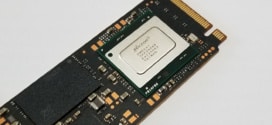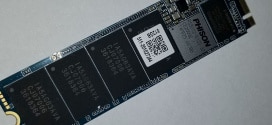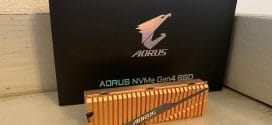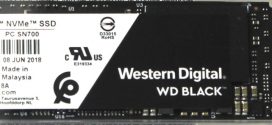The SSDNow V+ is a refresh of the V+ lineup with Toshiba Nand Flash and a Toshiba controller and is capable of speeds up to 230MB/s read and 180MB/s write.
INTRODUCTION
When Kingston announced it’s line of SSDNow V+ drives in October of 2009 we waited with baited breath to get our hands on the series. Now Kingston has refreshed the lineup with the SSDNow V and V+ series. Resigned with a Toshiba controller and Toshiba Nand Flash the drive we are looking at today boasts a 230MB/s read and a 180MB/s write speed. Previous versions had a Samsung controller and the new Toshiba controller and Nand MLC flash is expected to be faster and supports Trim out of the box in Windows 7.
Suitable applications include power users, system builders, system integrators and demanding corporate environments where efficiency and performance are important. With the results we’ve seen from the drives, they would boast a performance gain for any system not running a solid state drive.

The new box has gold color on the bottom and edge and also sports a 3 year warranty.
Kingston Second Generation SSDNow V+ Series Drives:
- Kingston SSDNow V+ Series SNV325-S2/64GB – $268.00
- Kingston SSDNow V+ Series SNV325-S2/128GB – $512.00
- Kingston SSDNow V+ Series SNV325-S2/256GB – $992.00
- Kingston SSDNow V+ Series SNV325-S2/512GB – $1,969.00
Kingston Second Generation SSDNow V+ Series Bundle Kits:
- Kingston SSDNow V+ Series SNV325-S2B/64GB – $283.00
- Kingston SSDNow V+ Series SNV325-S2B/128GB – $528.00
- Kingston SSDNow V+ Series SNV325-S2B/256GB – $1,008.00
- Kingston SSDNow V+ Series SNV325-S2B/512GB – $1,985.00
The SNV325-S2/128GB Kingston SSDNow V+ we have to look at today has a MSRP of $512 but we’ve seen it at popular e-tailors for $440. Still pricey, but $440 sounds better than $512. The 64GB model runs $268 and the top end 512GB (Drool) model hits $1,969 MSRP.
Features:
- Innovative – Uses MLC NAND flash memory components.
- Silent – Runs silent and cool with no moving mechanical parts.
- Shock Proof – No moving mechanical parts so the SSD is able to handle rougher conditions.
- Supports TRIM – Enhances device wear leveling by eliminating merge operation for all deleted data blocks
- Supports S.M.A.R.T. functions
- Guaranteed – 3 year legendary Kingston warranty, 24/7 tech support
With State of the art Toshiba MLC Nand flash and no moving parts backed by a rock solid Kingston 3 year warranty your drive will have a nice long lifespan and with Trim support in Windows 7. Performance will remain high throughout it’s lifetime.
Specification
- Capacity* – 64GB, 128GB, 256GB, 512GB
- Storage temperatures – -40 – 85°C
- Operating temperatures – 0 – 70°C
- Dimensions – 69.85 x 100 x 9.5 mm
- Weight – 84 grams
- Vibration operating – 2.7G (7-800Hz)
- Vibration non-operating – 20G (20-2000Hz)
- Sequential Read Throughput – 230MB/s
- Sequential Write Throughput – 180MB/s
- PCMark HDD 2005 Score+
- 64GB – 38,177
- 128GB – 38,065
- 256GB – 38,272
- 512GB – 37,974
- Form Factor – 2.5″
- Interface – SATA 1.5 Gb/sec. and 3.0 Gb/sec
- Power specs – 3.5 W – 4.2 W – active / 0.065 W – 0.075 W Idle
- Life expectancy** – 1,000,000 Hrs mean time before failure
- Operating shock – 1500G
The SSD lineup comes in capacities ranging from 64GB to 512GB and can be stored from -40°C to 85°C. The operating temperature range is 0°C to 70°C and the drive has a standard 2.5 inch form factor making it suitable for laptops and desktops (with adapter) alike. Top speed is 230MB/s read and 180MB/s write and uses the SATA 1.5GB/s and 3.0Gb/s interface (SATA 1 or 2 and should be backwards compatible with SATA 6 Gb/s). Life expectancy is still listed as 1,000,000 hours which if we remember right works out to something like 117 years. If we are still around in 117 years to see that then we’ll put the stamp of approval on that statement. The SSDNow V+ barely sips at power and uses 3.5W – 4.2W when active and 0.065W – 0.075W when idle.
Pictures & Impressions

Packaging hasn’t changed much on the SSDNow box but Kingston did change to a gold color to reflect the refresh of new components.

Inside the drive is encased in a plastic clamshell and anti-static bag and arrived in great shape.

On top the drive you find a sticker with the drives designation and the Kingston logo.

The bottom of the drive looks like it has a place for a sticker but none were used.

Here you can see the standard SATA connector and power connector. The 4 pins are used when doing a firmware flash update should you feel the need. With out of the box Trim support, Toshiba and Kingston might make refinements later but unless you’re experienced issues you might want to think twice about possibly bricking the drive with an improper flash.

As we mentioned earlier, we are working on the bare drive so we recieved a drive with the quick install instructions and nothing else. Given the choice, we would recommend the kit because the drive rails, Acronis software and external drive caddy make the additional $20 an attractive option.
TESTING & METHODOLOGY
To test the Kingston SSDNow V+ SSD we cloned our test rig drive to the SSD. It is the same test drive we’ve been using on all of our drive testing and is nothing more than a clean Windows load with all the drive testing software installed, as well as all the current drivers and patches for the OS. It’s the equivalent of doing a fresh load of Vista from the disc but takes a lot less time and ensures that every drive tested uses exactly the same OS load and drivers. Nothing that may effect the outcome of the testing procedure can creep in. We ran all of the tests a total of 3 times and averaged those results. The Average of the three results are presented here. In the case of a pictorial benchmark we ran the bench 3 times and picked the median result. As with most SSD testing differences from run to run are minimal and the median result is a good indication of what you can expect from the drive.
We ran our usual battery of tests on the drive, and used it as the primary boot drive during testing. All of the drives tested were used as the primary boot drive during testing. That’s a more realistic test than strapping the drive in and testing it with a bare format or as a non-boot drive and it represents real life transfer rates, much like you can expect when you install and operate the drive in your own system. Each test was performed 3 times and the average of the 3 test run is reported here.
Test Rig
| Test Rig “Quadzilla” |
|
| Case Type | Top Deck Testing Station |
| CPU | Intel Core I7 965 Extreme (3.74 GHz 1.2975 Vcore) |
| Motherboard | Asus P6T6 WS |
| Ram | Corsair Dominator (9-9-9-24 1.5v) 6GB Kit |
| CPU Cooler | Thermalright Ultra 120 RT (Dual 120mm Fans) |
| Hard Drives |
Kingston SSDNow V+ 128GB MLC |
| Optical | Asus BD-Combo |
| GPU | BFG GTX-275 |
| Case Fans | 120mm Fan cooling the mosfet CPU area |
| Docking Stations | None |
| Testing PSU | Thermaltake Toughpower 1200 Watt |
| Legacy | None |
| Mouse | Razer Lachesis |
| Keyboard | Razer Lycosa |
| Gaming Ear Buds |
Razer Moray |
| Speakers | None |
| Any Attempt Copy This System Configuration May Lead to Bankruptcy
|
|
Test Suite
|
Benchmarks |
|
ATTO |
|
HDTach |
|
Crystal DiskMark |
|
HD Tune Pro |
|
AS SSD Benchmark |
ATTO

As you can see we’ve got a smattering of drives on the chart from older 160GB drives to state of the art SSD’s. This allows you to see a wide variety of drive performance but we will only be making a direct comparison to drives in the same class.
The OCZ Agility is a SLC drive so for MLC drives the Kingston SSDNow tops the chart and easily takes the win for MLC solid state drives.

Here again we see the SSDNow V+ topping the chart and even manages a decent win over the OCZ agility SLC drive.

Moving on to the 1024k test we see the Kingston SSDNow V+ on top of the MLC drive list and it’s looking like a very solid drive in our opinion. So far, it’s worthy of the enthusiast drive class monickor.

The 1024k Read test shows a smoking fast 248.12MB/s transfer speed and the drive is exceeding the rated 230MB/s speed it’s rated to run at.

ATTO provides a lot of information and charting all of it would be a nightmare. You can imagine 24 charts for a single bench so we are including a screen shot of the median result we recorded. If you are interested in speeds that we didn’t chart you can check them out here.
Once the Kingston SSDNow V+ 128GB drive hit 64kb it had reached it’s rated speed and at 128kb and above consistently exceeded that speed.
Crystal DiskMark

In the 4k read test we see the SSDNow V+ holding it’s own at 19.14MB/s and while that’s not a top score it’s certainly nothing to complain about.

The 4k write test was quite good for the SSDNow V+ and it came out on top of the chart at 44.73MB/s.

In the 512k test the SSDNow V+ topped all the drives and came in at 207.6MB/s, an amazing speed for the Kingston drive.

The SSDNow V+ dropped off a little and hit 138.5MB/s in the 512k write test while the much more expensive OCZ Agility SLC drive bested it by quite a bit. If you’ve looked at SLC drive prices you’ll know why we don’t compare those to MLC drives. Different design and different storage methods. SLC stores one bit of data per cell while MLC stores 2 bits of info per drive so the controller has to work harder to fill each cell slowing it down somewhat.

The Sequential test shows the SSDNow V+ a little behind the Intel X25-M 80GB SSD but it’s within 2.3MB/s of it’s rated speed so we are good to go here.

The SSDNow V+ fell short of it’s advertised speed in the sequential write test but we’ll have to see how it fares in the other tests to see if that was just test specific.
HDTach

HDTach average speed came in at 203.5MB/s and the Intel drive topped it by a bit. Considering the Kingston SSDNow V+ has out of the box TRIM support, we know which drive will sustain performance longer.

The Burst test in HDTach shows the drive coming in at 235.1 MB/s, that’s a pretty decent burst speed.

We wanted to toss in a screen shot of HDTach, but naturally we forgot to do the screen shot while testing. So we had to go back, after we hammered the drive for several days, and take a screen shot. At this point, we haven’t ran TRIM on it yet. The drive has held up well to the hammering we gave it and the transfer speeds remained almost level throughout the entire test.
Sisoft Sandra
We didn’t chart Sandra because it provides a nice graph in the process of testing, and at times those provide more information than a bar chart.

Like we mentioned sometimes, the screen shot tells the story better than the bar chart. Notice how the other SSD’s wander all over the graph and the Kingston SSDNow v+ (red chart line) provides a level transfer speed in the 210MB/s range the entire test. That’s the consistency we expect from high end, well engineered drives.

This is an excerpt from Sandra showing the speed of the drive at a given position on the drive media. Normally at the end of a test, a platter drive slows down a lot. The SSDNow V+, being a solid state drive, stays in the 210MB/s – 217MB/s range all the way to the end of the drives media. That’s one big advantage of SSD’s; consistent transfer rates across the entire drive.
Hard Drive Tune Pro

The Minimum speed test shows the SSDNow V+ hitting 185.7MB/s and it was only topped by the popular Kingston SSDNow v 40GB drive with the Intel proprietary controller. The SLC Agility did top it, but again SLC and MLC aren’t good for direct comparisons.

The Maximum speed test shows the SSDNow V+ at 195MB/s and it came in third amoung the MLC drives. We suspect that the test favors the Intel controller drives, because both the drives that topped it are indeed Intel controller drives.

The drive came in with a lackluster burst speed of 162.9MB/s and we checked it several times and confirmed the speed with other results obtained on the same model drive.

Average speed in Hard Drive Tune Pro was 194MB/s and again the Intel controller drives bested it as did the SLC drive. Still, 194 MB/s is a pretty good speed in this test.

We went ahead and ran a screen shot of the File benchmark in HD Tune Pro. As expected, speeds start out low at 0.5kb and increase through 128kb. Then level off and remain in the 200+ MB/s read and 150MB/s write, except for one burp at 512kb write, where performance dropped to 100MB/s. We were writing 64MB files and each test used a different size block of information, written to fill the 64MB. Like the 1024k (1MB) test was written 64 times to total 64MB, the 512k test was written 128 times to total 64Mb and so on.
AS SSD Benchmark
Here again, we went with a screen shot of the drives performance in file and IOPS rather than a chart, because we are primarily concerned with the drive’s performance. SSD’s come in so many flavors and with different controllers it’s hard to get a level playing field comparison between drives. There really is no level playing field to play on. The best you can do is report the speed of all the drives.

Since AS SSD Benchmark was specifically written for SSD’s, we rely heavily on it for our decision about SSD performance. We also use the traditional tools and those scores are taken into account, but AS SSD weighs a little heavier in scoring the drives.
The Sequential read test comes in at 216.75 MB/s read and 176.13MB/s write and that’s pretty close to the drive’s rated specifications. The 4k test hich is brutal on any drive showing a 13.51 MB/s read and 9.70 MB/s write speed, which is pretty typical for high end SSD’s in that portion of the test. The 4k-64k threaded test shows 16.76MB/s read and 7.11 MB/s write and again pretty typical for higher end drives. The access time ranged between 0.142ms and 0.437ms and the overall score for the drive was 117.

We ran the IOPS (Input/Output per second) on the Kingston SSDnow V+ and it showed that it’s not breaking any land speed records, but it’s in the same range as most higher quality SSD’s, so there’s nothing to worry about here.
PCMark Vantage
We went a little off field when using PCMark Vantage. What we hear from readers all the time is that SSD storage is expensive and they don’t see the benefit of a smaller more expensive storage device. What we did here is benchmark a 1TB 5900rpm Green Seagate drive, a SATA 3 2TB Seagate drive, and the Kingston SSDNow so you can see the inherent advantages of a SSD. Keep in mind these are two totally different designs and this is not for a level playing field comparison. This is strictly done to highlight the advantages of SSD’s for the naysayers.

This is for the naysayers out there, look at the long line at 66.127MB/s and the fastest SATA 3 drive tested on a SATA 3 interface with Turbo enabled on the Gigabyte board hitting 5.474MB/s. The SSDNow V+ performs 12x better than the Barracuda XT 7200 RPM drive. Say “nay” now naysayers! That’s the advantage of an SSD.

The Windows Defender test shows the SSDNow V+ coming in at 146.211MB/s and the Barracuda XT SATA 3 drive hitting 25.578MB/s. The SSD is operating close to 8x faster than the platter drive.

Gaming, (which is a big concern with a lot of our readers and those between level, load screens), can get pretty annoying as time drags by while you wait to get back to kicking some serious butt. The SSDNow V+ hit 148.225MB/s while the closest platter drive came in at 16.993MB/s so the SSDNow is operating at 8.7x faster than the platter drive.

When importing pictures to the Windows Photo Gallery, we see the SSDNow making 167.845MB/s. While the Barracuda XT holds at 16.933MB/s, so the SSD is about 10x faster.

It wasn’t a clean sweep in PCMark Vantage. The Barracuda XT got a little revenge and topped the SSD at 58.807MB/s, while the SSD came in at 46.583MB/s. Despite repeated testing the numbers we recorded held true.

Vista startup shows one big advantage of SSD’s. The Operating System start up hits 127.492MB/s, while the closest platter drive hits 21.675MB/s, so you can expect Vista to load much faster.

The overall score on the SSDNow was 19249 and it’s closest competitor came in at 5503, so you can see that PCMark Vantage (which uses a realistic benchmarking suite that utilizes the programs we use) thinks that SSD’s are superior to platter drives. For all intents and purposes, SSD’s are superior in transfer rates, but that also means that they are higher priced. That’s a trade off that only you can decide is worthwhile or not.
Conclusion
The redesigned SSDNow V+, with it’s Toshiba controller and MLC Nand Flash, improves on an already good product. The three year warranty isn’t going to hurt anyone’s feelings and with no moving parts to wear out, the SSDNow V+ 128GB drive, will give you years of good service. With support for Trim in Windows 7, performance will remain high throughout the life of the drive.
Performance on the drive is in line with the rated 230MB/s Read and 180MB/s Write and the drive consistently remained high in our charts. Of course the much more expensive SLC drive topped the SSDNow’s performance, but did so at a premium price. Beyond that SLC drive, we would have to say that the SSDNow V+ performed as well as any SSD we’ve seen. It performed well enough that we would place it outside the mainstream category and place it in the enthusiast class. How Kingston markets it is of course up to them, but we know enthusiast class when we see it and this drive qualifies.
One big advantage of the SSDNow V+ is that it features out of the box Trim support in Windows 7 and doesn’t require a firmware flash to acquire it. As we all know, sometimes firmware flashes go south and we are left with a paperweight. The SSDNow V+ alleviates that concern and allows you to simply plug it in and enjoy the smoking fast transfer rates without the worries involved with firmware flashing.
Kingston has a winner in the SSDNow V+, with its new design. The new Toshiba controller and Nand flash bring new life to the SSDNow V+ line.
| OUR VERDICT:Kingston SSDNow V+ | ||||||||||||||||||
|
||||||||||||||||||
| Summary: The Kingston SSDNow V+ is without a doubt a blazing fast drive and will provide a boost to any system running a platter drive. SSD’s are still expensive, but the best technology always is. Purchasing one and being on the cutting edge of technology doesn’t come cheap. We would rather be on the cutting edge and running with the big dogs, than staying on the platter (porch) with the little dogs. It’s a lot like swimming in the ocean. When you see a shark, you don’t have to outrun the shark, just the guy beside you. The Kingston SSDNow V+ will give you that advantage; you get to stay ahead of the shark and run with the big dogs. |
Kingston Second Generation SSDNow V+ Series:
- Kingston SSDNow V+ Series SNV325-S2/64GB – $268.00
- Kingston SSDNow V+ Series SNV325-S2/128GB – $512.00
- Kingston SSDNow V+ Series SNV325-S2/256GB – $992.00
- Kingston SSDNow V+ Series SNV325-S2/512GB – $1969.00
Kingston Second Generation SSDNow V+ Series Bundle Kits:
 Bjorn3D.com Bjorn3d.com – Satisfying Your Daily Tech Cravings Since 1996
Bjorn3D.com Bjorn3d.com – Satisfying Your Daily Tech Cravings Since 1996








